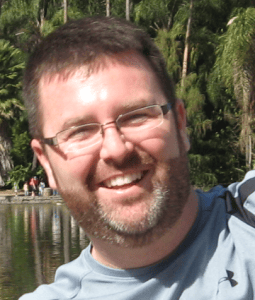AHA members are involved in all fields of history, with wide-ranging specializations, interests, and areas of employment. To recognize our talented and eclectic membership, AHA Today features a regular AHA Member Spotlight series.
 Stephen W. Campbell is an adjunct lecturer at Pasadena City College. He lives in Pasadena, California, and has been a member since 2013.
Stephen W. Campbell is an adjunct lecturer at Pasadena City College. He lives in Pasadena, California, and has been a member since 2013.
Twitter Handle: @HistorianSteveC
Almamaters: I completed my PhD in history at the University of California, Santa Barbara in 2013.
Fields of interest: 19th-century US history, political history, economic history, environmental history
When did you first develop an interest in history?
This goes back to childhood. I always loved maps as a kid and found that the subject of history was best suited to my love of maps. Even to this day, I incorporate them into my lectures. As a young boy I was fascinated by the Civil War and I used to memorize all the battles and generals. Ken Burns’s famous series on the Civil War was out and I also enjoyed Ted Turner’s adaptation of Gettysburg, based on the novel by Michael Shaara. I had an inspiring and rigorous teacher for AP US history in high school and the rest is history!
What projects are you working on currently?
Teaching currently takes up most of my time, but when I can spare a few moments, I work on revisions to an article-length manuscript on Nicholas Biddle’s campaign techniques. I’m also in the beginning stages of turning my dissertation into a monograph.
Have your interests changed since graduate school? If so, how?
When I first entered my doctoral program, it seemed like everyone was studying race. I actually found it quite stultifying. However, over the last few years I have come around to the undeniable importance of race as an analytical category, and I often bring up issues of race in my lectures. Current events colored my thinking. Witnessing the rise of Barack Obama and the attendant Tea Party backlash, I became firmly convinced that racial resentment acted as a powerful undercurrent of topics that seemed, on the surface, to be only about politics and economics. This proved no less true as I re-examined historical content to round out my lectures.
Is there an article, book, movie, blog etc. that you could recommend to fellow AHA members?
Naomi Oreskes and Erik Conway provide an incisive account of the ways in which oil companies, much like tobacco companies a few decades ago, have manufactured doubt among the American public regarding human-caused climate change. I also recommend Michelle Alexander’s The New Jim Crow; Thomas Piketty’s Capital in the Twenty-First Century; Gabor Mate’s When the Body Says No; and Academically Adrift by Arum and Roksa.
What do you value most about the history profession?
I enjoy giving students a basic set of skills that will help them become informed citizens and makes sense of the world. I also enjoy integrating my own research into the classroom; detecting patterns and continuities across space and time; and taking complex subjects (like credit-default swaps) and breaking them down into digestible concepts.
Why did you join the AHA?
I joined the AHA in order to seek professional advice, network with other historians, and discover the numerous ways in which the skills used by historians can provide practical benefits to one’s life. The Tuning Project has been particularly useful here.
Do you have a favorite AHA annual meeting anecdote you would like to share?
Unfortunately, I do not. However, I hope to have a valuable and fun experience at this year’s meeting in New York City.
Other than history, what are you passionate about?
Climate change; meditation and exercise; progressive alternatives to mainstream media; resisting the commodification of public education; and demanding that we talk about structural inequalities within larger society before we go after teacher tenure at the K-12 level in the name of so-called “reform.”
Any final thoughts?
I join a very long list of scholars lamenting the dire straits currently confronting the humanities in academia. We have all come to the same conclusion that there is something terribly wrong in a public education system that rewards administrative positions handsomely, increases student fees (and thus student loan debt), refuses to open up more tenure-track lines to account for the surplus of PhDs on the market, keeps faculty salaries stagnant, makes tenure requirements increasingly insurmountable, and relies so heavily on exploitable adjunct labor. College has become a business that demands that we do more with less. It devalues the artistry and expertise involved in teaching, reduces educational standards to levels designed to please students as customers, and makes teachers conform to a presumed standard of uniformity where student evaluations are exalted as the final verdict on what constitutes “good teaching.” Given this pernicious reality, the current crop of recently minted PhDs, myself included, can hardly be blamed for being bitter and resentful.
This post first appeared on AHA Today.
This work is licensed under a Creative Commons Attribution-NonCommercial-NoDerivatives 4.0 International License. Attribution must provide author name, article title, Perspectives on History, date of publication, and a link to this page. This license applies only to the article, not to text or images used here by permission.